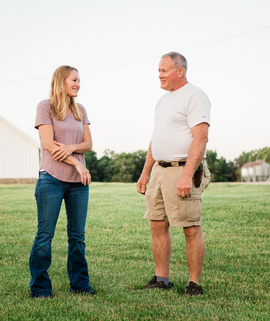
In the competitive world of pork production, keeping up with industry trends and optimizing farm operations can be daunting. One highly effective strategy for navigating these challenges is being part of a farmer peer group, if given the opportunity.
Composed of pork producers who meet regularly to discuss industry-related issues, these groups provide a unique platform to:
1. Gain fresh perspectives
One key benefit of a farmer peer group is the opportunity to gain new insights. Pork production is a multifaceted industry, and producers often employ different approaches and strategies. By engaging with peers who have diverse experiences and viewpoints, producers can broaden their understanding of best practices and innovative techniques. For example, producers struggling with feed efficiency might gain valuable insights from a peer who has successfully implemented a new feed strategy. This exchange of ideas can lead to improved practices and solutions that may not have been considered in isolation.
2. Challenge each other
Peer groups foster an environment where members are encouraged to challenge one another to improve. Constructive criticism and healthy debate are essential for growth. When producers present their practices or results, they receive feedback from their peers, which can help highlight areas for improvement. This process promotes continuous improvement, as members push each other to refine their strategies and strive for excellence.
3. Benchmark performance
Benchmarking is another major advantage of participating in a peer group. By comparing their performance to that of their peers, producers can better understand how they measure up against industry standards. Key metrics such as feed efficiency, mortality rates, growth rates and cost management are often discussed.
Benchmarking helps producers identify gaps in their operations and set realistic goals for improvement. For instance, if one producer consistently markets a higher percentage of grade A pigs, others can examine the contributing factors and implement similar strategies to improve their own results.
|
4. Learn and network
Networking is a vital aspect of peer groups, offering members access to a wealth of knowledge and resources. Through regular meetings and interactions, producers build valuable relationships with others in the industry, creating opportunities for collaboration, resource sharing and friendships.
Farmer peer groups also provide extensive learning opportunities, often featuring guest speakers, case studies and discussions of the latest industry challenges. This shared learning experience helps producers stay informed about new developments and apply cutting-edge techniques to their operations.
By participating in these groups, producers can improve their operations, remain competitive and continuously refine their practices. In a dynamic and evolving swine industry, the support and insights gained from a peer group can make a significant difference in achieving long-term success. For pork producers looking to optimize their farms and navigate industry challenges effectively, partaking in a peer group is a strategic investment.






